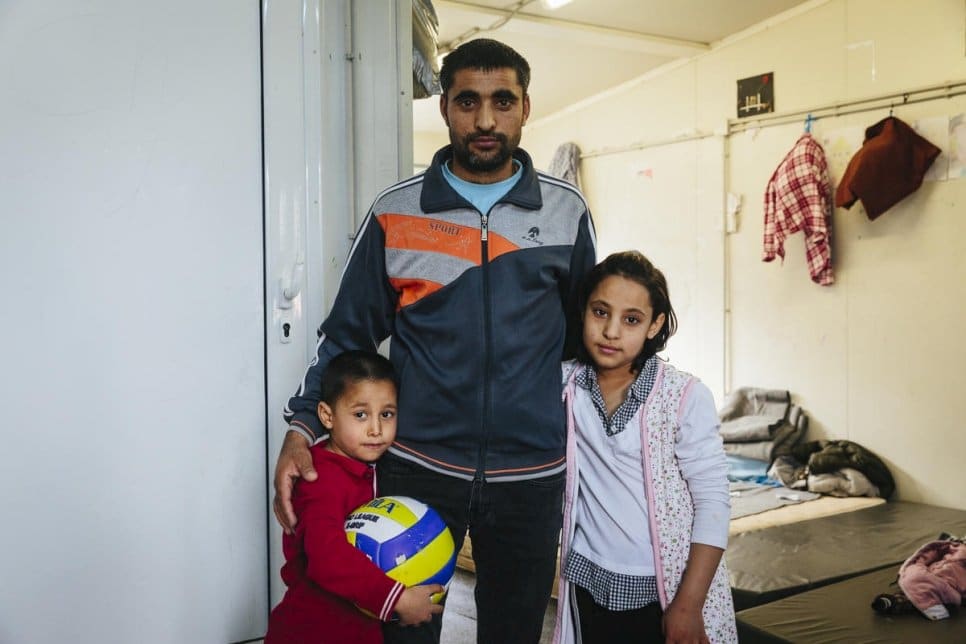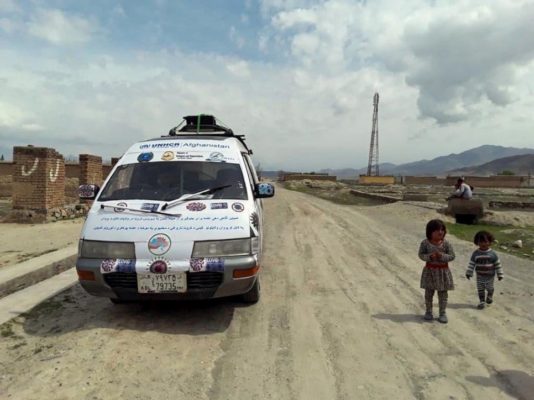
An Afghan asylum seeker stands with two of his childern at a reception centre in Fylakio, Greece, in February 2020. © UNHCR/Achilleas Zavallis
With the world mobilizing to combat the spread of COVID-19, many countries in Europe and beyond have adopted exceptional measures to manage their borders, limiting air travel and cross-border mobility. UNHCR, the UN Refugee Agency, has called today on European countries to safeguard the many good practices and redouble their efforts to strengthen asylum systems in Europe in these trying times.
It is encouraging that nearly two thirds of European countries have found ways to manage their borders effectively while allowing access to their territories for people seeking asylum. Medical screenings at borders, health certification or temporary quarantine upon arrival are some of the measures put in place by European countries. These are important positive precedents for other States in Europe and beyond.
“With refugees and asylum-seekers at the centre of our efforts, we have prepared a series of practical recommendations in support of national asylum systems as we continue to provide our expertise to governments,” said Pascale Moreau, UNHCR’s Regional Director for Europe.
Measures to mitigate a COVID-19 spread, such as physical distancing and restrictions on movements and gatherings, have impacted the functioning of asylum systems in Europe, be it the registration of new asylum claims and documentation, status determination or judicial reviews. Consequences can be serious for individuals concerned as well as States. For example, where new asylum claims are not registered, people’s stay is not regulated, and they have no access to basic assistance and health services. Where asylum procedures are suspended, national asylum authorities will face significant challenges upon resumption, or worse, risk to lose or even reverse past investments in national asylum systems.
Recognizing the risks of such adverse consequences, the majority of European countries have at least in part adapted their asylum systems to the current situation. Registration procedures have been simplified, adjusted to permit written or electronic submissions, or frontloaded to coincide with medical screenings, while automatizing the issuance of documentation. Others have adjusted the physical infrastructure in interviewing facilities or are testing and upscaling remote interviewing techniques, such as through video-conferencing, to continue with asylum procedures.
Reception capacities for new arrivals in a number of European states have been under pressure for some time – a situation now aggravated by the COVID-19 emergency. Virus transmission risks are particularly high in overcrowded reception facilities or confined spaces, such as in immigration detention facilities. A number of States have begun to release detained asylum-seekers into safer reception conditions. States have also taken a variety of proactive measures to improve conditions in reception facilities with a view to reduce transmission risks. Some have quickly created additional temporary reception capacity by populating unused facilities or empty hotels to decongest crowded facilities, prioritising the move of at-risk groups, such as older persons.
“Recognizing enormous challenges posed by the health crisis, we urge States to also continue their life-saving efforts in rescuing refugees and migrants in distress at sea,” said Moreau.
“There should be no delay or hesitation in our actions when it comes to saving lives. When people desperately searching for safety arrive at our borders, whether on land or at sea, we must never turn our backs or return people back to the danger from which they fled.”
Reception capacity constraints are also a main reason challenging the disembarkation of refugees and migrants who have been rescued after harrowing journeys across the Mediterranean. However, while increasing reception capacity in receiving European countries is an important starting point, more efforts are needed, including stronger intra-EU solidarity in the form of relocation.
As Europe starts to shift measures in its response to COVID-19, there lie risks but also opportunities. Measures taken at a time of adversity, may contribute to building more resilient asylum systems for the future.
“We should collectively identify and embrace such opportunities, for example the digital means to register asylum claims, the use of remote means of interviewing or efforts to make asylum procedures faster while remaining fair,” said Moreau. “UNHCR remains appreciative of host communities and States for their efforts to protect the asylum space in Europe at the times of heightened public health risks for all.”
Harnessing the good practices deployed across Europe, UNHCR’s Regional Bureau for Europe has issued a compilation of good practices and practical recommendations. These offer practical support to States in ensuring access to territory and asylum, addressing movement restrictions or in communicating effectively with asylum-seekers and refugee populations on COVID-19 risks.
For more information on this topic, please contact:
- In Berlin, Chris MELZER, melzer@unhcr.org, +49 151 706 660 13
- In Budapest, Zoran STEVANOVIC, stevanoz@unhcr.org, +36 305 309 633
- In London, Matthew SALTMARSH, saltmars@unhcr.org, +44(0)7880 230 985
- In Madrid, Maria Jesus VEGA, vegam@unhcr.org, +34 670 661 263
- In Paris, Céline SCHMITT, schmittc@unhcr.org, +33 6 23 16 11 78
- In Rome, Carlotta SAMI, sami@unhcr.org, +39 335 679 47 46
- In Stockholm, Elisabeth Arnsdorf HASLUND, haslund@unhcr.org, +45
- In Geneva, Andrej MAHECIC, mahecic@unhcr.org, +41 79 642 9709
Originally published by UNHCR on 27 April 2020





